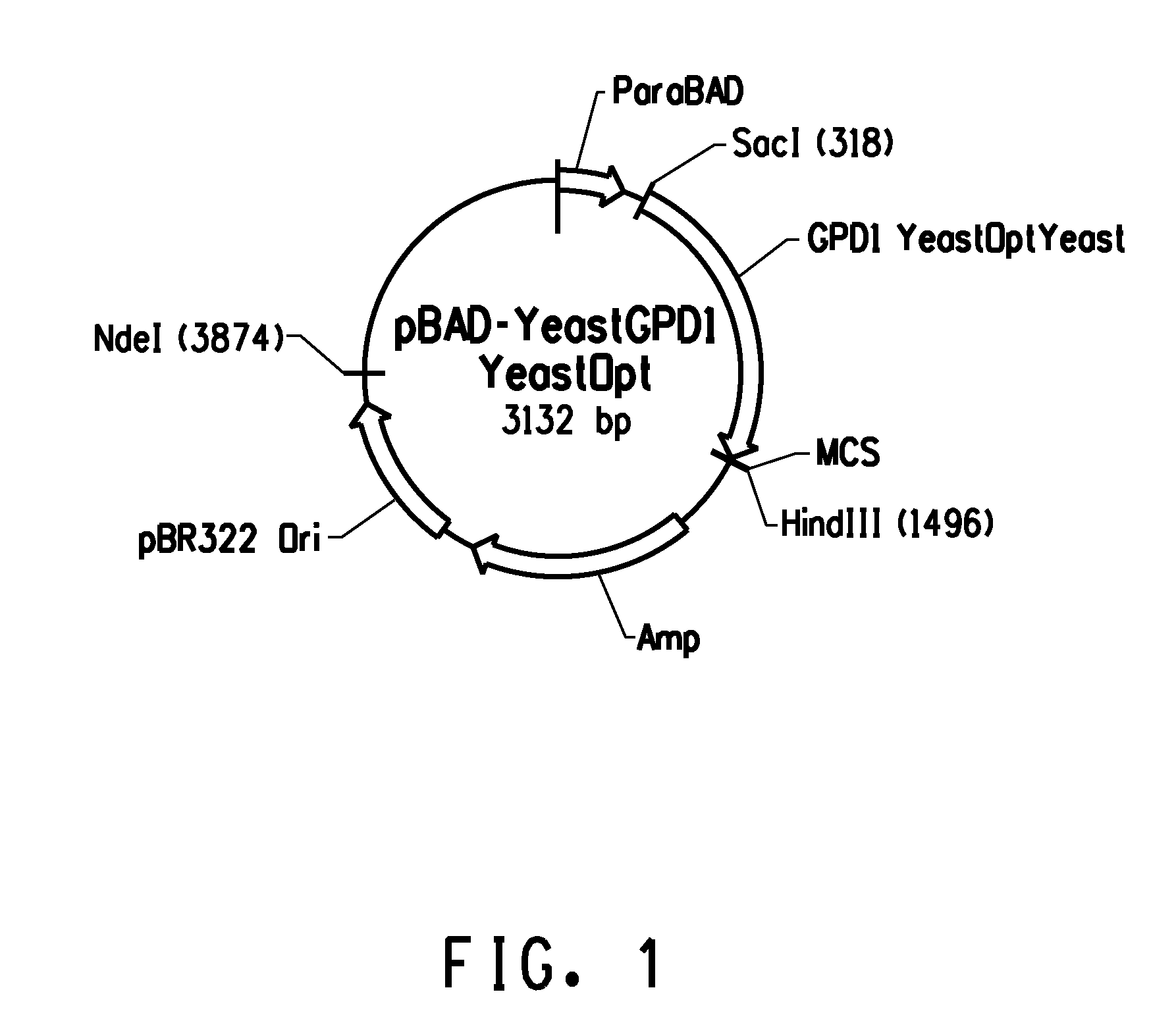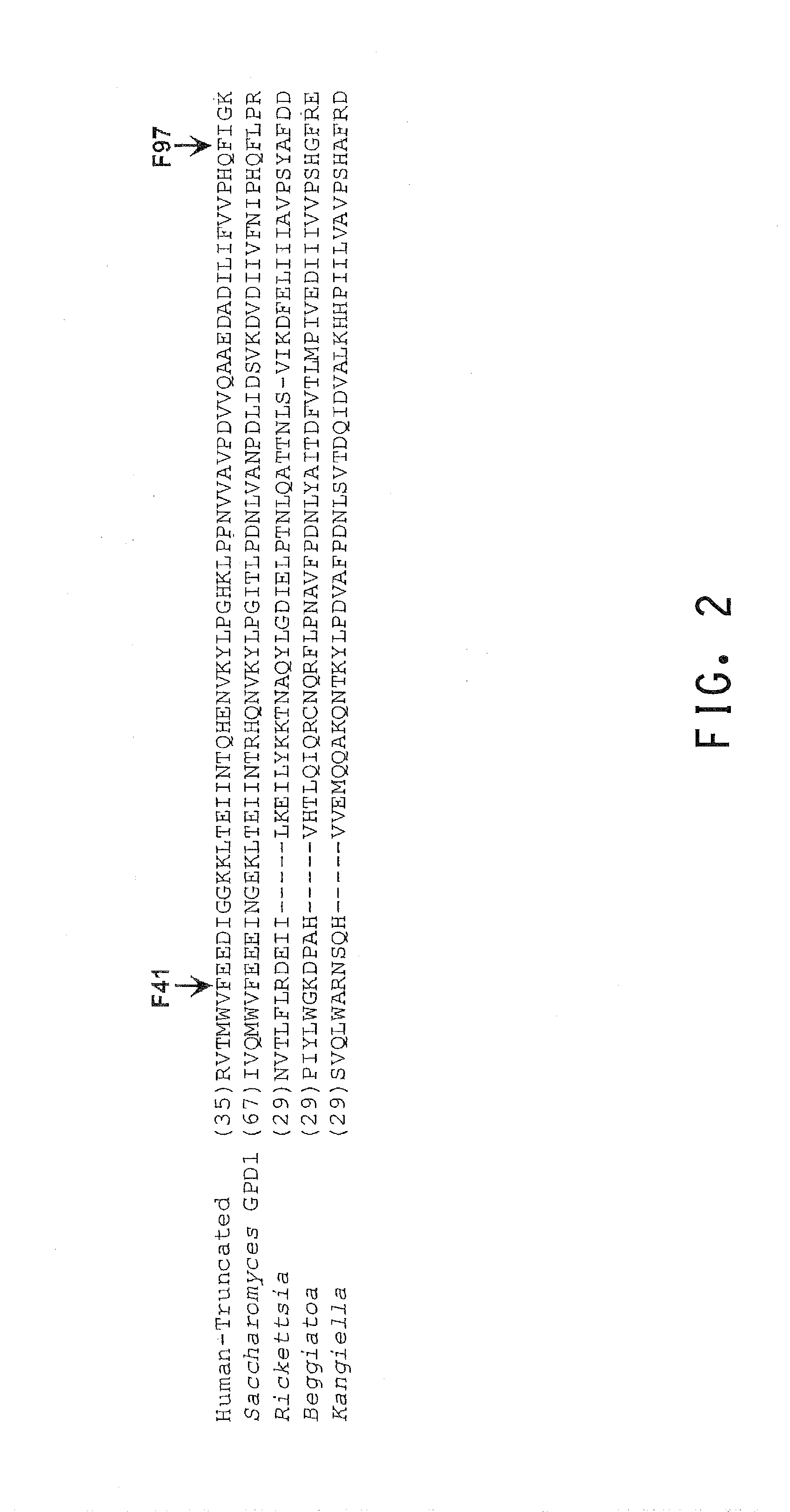Glycerol 3- phosphate dehydrogenase for butanol production
a phosphate dehydrogenase and butanol technology, applied in the field of industrial microbiology and the fermentation production of butanol and isomers, can solve the problems of high cost, unenvironmental protection, and use of starting materials derived from petrochemicals in the process, so as to improve or increase the molar ratio of butanol and glycerol. the effect of increasing the molar ratio of butanol and glycerol
- Summary
- Abstract
- Description
- Claims
- Application Information
AI Technical Summary
Benefits of technology
Problems solved by technology
Method used
Image
Examples
example 1
Variant GPD1 Enzymes
[0317]In this example, variant versions of Saccharomyces GPD1 were created and tested by expression in E. coli followed by enzymatic assays on the crude cell extract.
GPD1 Mutagenesis
[0318]Mutagenesis of yeast GPD1 was directed by the desire to increase the KM for NADH without having an impact on other kinetic parameters of the enzyme. The approach to mutagenesis was based on the high resolution crystal structures of human GPD1 (Ou et al, 2005, J. Mol. Biol. 357: 858-869), which allowed for the determination of the amino acids within contact distance of NAD in the cofactor binding pocket. By analyzing the amino acid residues and the type of contact made, it was possible to limit the number of amino acid changes to result in an increase in the NADH KM value. Table 6 shows the results of this analysis, where the amino acid residues within 5 Angstroms of the bound NAD have been enumerated, and the role in NAD binding was interpreted. Because of their role in the pi-s...
example 2
Heterologous GPD Enzymes with Higher KM for NADH than S. cerevisiae GPD
[0328]In this example, alternate glycerol-3-phosphate dehydrogenase enzymes with Michaelis constants (KM) for NADH that are higher than yeast GPD1 were identified.
[0329]One strategy to identify higher NADH KM enzymes is to use values published in literature for those enzymes that have been previously identified. Table 10 enumerates publications where the NADH KM is higher than that reported for Saccharomyces GPD1.
TABLE 10Published NADH KM for GPDsNADH KM (mM)SourceReference0.023 SaccharomycesAlbertyn et al. 1992, Cerevisiae GPD1FEBSLett. 308: 1300.024 LeishmaniamexicanaMarche et al, 2000,MolBiochemParasitol. 106: 83-910.032 JaculusorientalisBerrada et al, 2002 MolCellBiochem. 231: 117-270.0589DunaliellaviridisHe et al, 2009, GPDH1PlantMolBiol. 71: 193-2050.0592DunaliellaviridisHe et al, 2009, GPDH2PlantMolBiol. 71: 193-2050.078 DrosophilaNiesel et al, 1982, melanogasterMethodsEnzymol. 89, 296-301
[0330]The enzyme ...
example 3
Isobutanol and Glycerol Production for Yeast Strains Comprising GPD1 Enzyme Variants
[0337]In this example, yeast strains with variant GPD1 enzymes produced and described above were tested for isobutanol and glycerol production.
[0338]PNY2145 GPD and GPD variant strains with isobutanol pathway plasmid were plated on synthetic complete agar plates [1× yeast nitrogen base without amino acids (Difco), 1× amino acid drop-out without uracil (Clone-tech) containing 2% agar (Difco), 0.2% ethanol] and incubated for 72 hours at 300 C incubator (New Brunswick)
[0339]Cells were patched on synthetic complete medium [1× yeast nitrogen base without amino acids (Difco), 1× amino acid drop-out without uracil (Clonetech) containing 2% agar (Difco), 1% glucose (sigma), 0.2% ethanol] and incubated for 72 hours at 30° C. incubator (New Brunswick). Cells were adapted by repetitive plating every three days on same media for 30 days.
[0340]Patches of the adapted cells were inoculated in 10 ml of synthetic com...
PUM
| Property | Measurement | Unit |
|---|---|---|
| Fraction | aaaaa | aaaaa |
| Molar density | aaaaa | aaaaa |
| Molar density | aaaaa | aaaaa |
Abstract
Description
Claims
Application Information
 Login to View More
Login to View More - R&D
- Intellectual Property
- Life Sciences
- Materials
- Tech Scout
- Unparalleled Data Quality
- Higher Quality Content
- 60% Fewer Hallucinations
Browse by: Latest US Patents, China's latest patents, Technical Efficacy Thesaurus, Application Domain, Technology Topic, Popular Technical Reports.
© 2025 PatSnap. All rights reserved.Legal|Privacy policy|Modern Slavery Act Transparency Statement|Sitemap|About US| Contact US: help@patsnap.com



